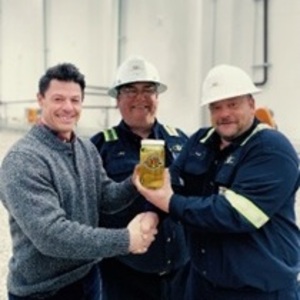CRC begins biofuel production at Kentucky plant

Continental Refining Co.
January 25, 2023
BY Continental Refining Co.
Just one short year after the official groundbreaking ceremony for its recent construction and renovation, the Continental Refining Co. has started production at its repurposed agricultural and petroleum complex and is now producing B100 biodiesel blends from soybean crude oil feedstock it has purchased from suppliers. Over the last year, CRC has undergone an “AgriTech” evolution, investing an additional $31.5 million to acquire and install a soybean crushing, biodiesel refining and blending facility at the legacy CRC oil refinery in Somerset, Kentucky.
The move comes amid surging demand for vegetable oils to produce bio and renewable diesel (a lower-carbon fuel that is chemically identical to petroleum-based diesel) and the increasing use and export of soybean meal. CRC has begun to receive contract soybeans and will begin crushing its own soybeans later in the first quarter of 2023. Once in full operation, the plant will have the capacity to process nearly four million bushels of soybeans per year (84 thousand tons) into vegetable oil and soybean meal for livestock and poultry feed, while its biodiesel refining division will generate up to five million gallons per year as planned.
A new fuels terminal has been established on the property as well. CRC officially reopened its fuel distribution and bulk lubricant operations at the end of 2021, offering on-site fueling for retail, commercial and industrial, construction, agriculture, and residential customers. CRC serves as a fuel producer and distributor based in Somerset, Kentucky serving customers in Pulaski and the eight surrounding counties. It has also entered into marketing agreements to distribute bulk lubricants and products. CRC recently purchased Russell County Oil as part of its expansion plans and is now selling its fuels locally at Midland Farms. The company offers two types of transport as part of its services – large tanker transport and tank wagon.
Local entrepreneur and Hemisphere Limited CEO Demetrios Haseotes purchased the refinery in 2011, investing over $40 million updating and improving the facility’s crude oil refining capabilities over the years. Haseotes will now shift his focus to soybeans as the future of diesel energy production and additives at his Continental refinery. “Our mission at CRC is to operate an agricultural and petroleum industrial complex as an innovative leader to produce and distribute high quality feed and fuel products, foster interdependent relationships with local farmers and the Central Kentucky communities we serve, and provide exceptional value and service to our loyal customers,” said Haseotes. “I can’t say enough to express our appreciation for the hard work of CRC’s employees to make this project a success!”
Employment:
CRC will create up to 36 new jobs with an annual payroll of over $2.65 million (including taxes and benefits) and an average salary range of approximately $18-20 per hour.
Advertisement
Facility:
CRC is located on 77 acres in the heart of Somerset, KY. This revitalization process includes the acquisition and installation of its soybean crushing and biodiesel facility. CRC’s crushing facility will process nearly four million bushels of soybeans per year (84 thousand tons) while its biodiesel refining division will generate up to five million gallons per year as planned. CRC’s product terminal will have the ability to distribute over 130 million gallons of product.
Products:
CRC intends to generate income by engaging in the sales of the below listed products and services:
•ULSD (Ultra Low Sulfur Diesel) both on road and off road
•Gasoline
•Biodiesel ranging from B6 to B100
Advertisement
•Soy Hulls
•Soybean Oil for industrial use
•Crude Glycerin
Benefits:
•The company will utilize local businesses to provide soybean feedstock that will be refined into biodiesel fuels to support the farm, school and community fuel needs of Pulaski County, Kentucky and surrounding regions.
•Biodiesel is a domestically produced, clean-burning, renewable substitute for petroleum diesel. Using biodiesel as a vehicle fuel increases energy security, improves air quality and the environment, and provides safety benefits.
•The in-state crushing facility will reduce costs for farmers, keep jobs in Kentucky, reduce wear and tear on infrastructure and contribute positively to the economies of Pulaski County and the greater Commonwealth.
•The revitalized facility will have a significant economic impact, as it relies heavily on a network of local producers and has the potential to develop ancillary business opportunities through the supply chain in the region. Beneficiaries include local producers, equipment and machinery manufacturers, other value-added agriculture processors, and businesses in the construction and logistics service sectors to name a few.
Related Stories
NREL announced the findings of the Assessment of BQ-9000 Biodiesel Properties for 2024, the eighth in a series of annual reports documenting the quality of biodiesel from U.S. and Canadian producers participating in the BQ-9000 program.
Kintetsu World Express Inc. has entered into a new agreement with Shell Aviation regarding the use of SAF. Under this agreement, KWE will adopt Shell Aviation's digital platform "Avelia" to swiftly address shippers' low-carbon transportation needs.
Aemetis Inc. released Q2 results, reporting increase revenue when compared to Q1. During an earnings call, company officials detailed progress with the company’s RNG, ethanol, biodiesel, SAF and carbon CCS projects.
Calumet Inc. on Aug. 8 confirmed its Montana Renewables biorefinery is currently running at full capacity. An initial phase of the company’s MaxSAF initiative remains on track to boost SAF capacity to up to 150 MMgy by mid-2026.
Marathon Petroleum Corp. on Aug. 5 released second quarter financial results, reporting improved EBITDA for its renewable diesel segment. The company primarily attributed the improvement to increased utilization and higher margins.
Upcoming Events










